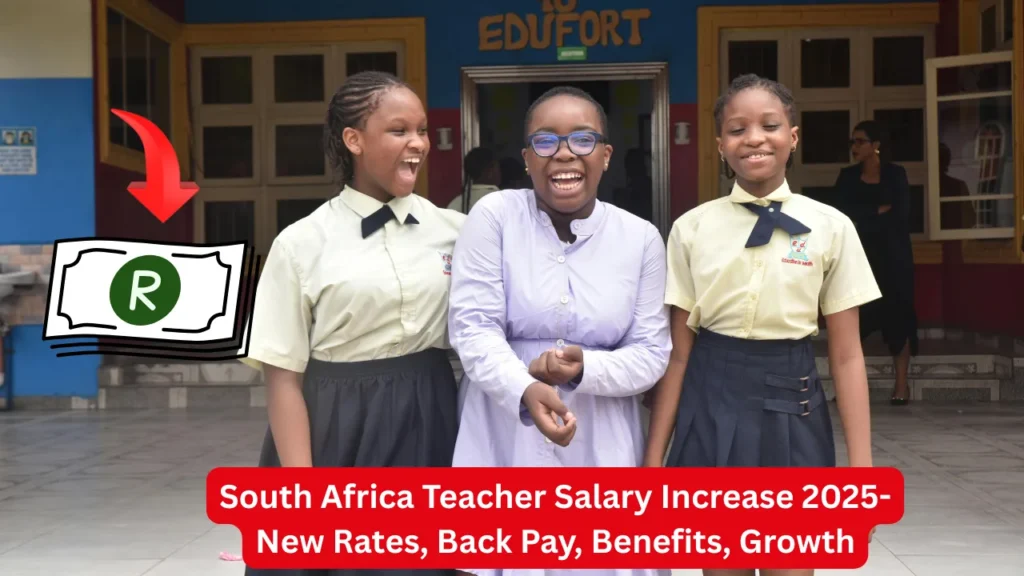South Africa Teacher Salary adjustments in 2025 bring a meaningful lift for educators. A general 5.5% increase applies from April 2025 with back pay, and a multi-year path ties 2026 and 2027 adjustments to inflation (CPI) within a 4%–6% range. The new structure rewards qualifications (REQV levels) and experience (salary notches), while senior posts in school management see substantial ceilings that reflect leadership responsibilities.
South Africa Teacher Salary Increase 2025 New Salary
| General increase | 5.5% from April 2025 with back pay |
| Future path | CPI-linked increases in 2026 & 2027 (floor 4%, cap 6%) |
| Pay structure | REQV 10–12, 13, 14–17 + 432 salary notches |
| Classroom ranges (2025) | R163,179 – R763,608 per year depending on REQV & notch |
| Management ranges (2025) | Dept. Head: R435,240–R1,052,718 • Deputy Principal: R514,563–R1,138,056 • Principal (P5): R858,426–R1,275,789 |
| Typical monthly figures | Entry teacher ≈ R13,600 • Senior educator > R63,000 • Top principal > R106,000 |
| Key benefits | Pension, medical aid subsidy, housing allowance, annual bonus/incentives |

How the pay system works: REQV + notches
The engine of South Africa Teacher Salary progression rests on two levers:
- REQV (Relative Education Qualification Value) signals your highest recognised qualification.
- REQV 10–12: matric plus partial teacher training
- REQV 13: recognised diploma/degree
- REQV 14–17: advanced or postgraduate qualifications
- Salary notches (1–432) reflect years of service and performance steps.
Together, they set your placement on the scale and your pathway to higher earnings as you gain experience or upgrade qualifications.
New 2025 salary bands for classroom teachers
All classroom roles benefit from the 2025 uplift. Here are the consolidated annual ranges:
- Entry-Level (REQV 10–12): R163,179 – R268,008
- Mid-Level (REQV 10–12): R270,498 – R577,407
- Senior Teacher (REQV 13): R415,038 – R577,407
- Master Teacher (REQV 13): R485,868 – R577,407
- Teacher (REQV 14–17): R351,972 – R763,608
- Senior Teacher (REQV 14–17): R415,038 – R763,608
- Master Teacher (REQV 14–17): R485,868 – R763,608
What this means in practice: a new teacher earns about R13,600 per month, while highly qualified senior educators cross R63,000 per month, depending on notch and REQV placement. Moving up the scale through years of service or upgraded qualifications steadily raises pay.
School management: bigger responsibility, bigger ceiling
Leadership roles carry higher ranges that recognize complex duties such as instructional leadership, staff development, and fiscal oversight:
- Departmental Head: R435,240 – R1,052,718 (≈ R36,000+ per month at typical points)
- Deputy Principal: R514,563 – R1,138,056 (up to ≈ R94,800 per month)
- Principal (P5): R858,426 – R1,275,789 (top end ≈ R106,300 per month)
These bands make the South Africa Teacher Salary pathway attractive for educators ready to step into management or pursue principalship.
Benefits that raise total compensation
Salary is one part of total pay. Teachers also receive:
- Pension fund contributions that build retirement security
- Medical aid subsidies that cut family healthcare costs
- Housing allowance to support accommodation needs
- Annual bonuses and incentives tied to policy rules
When you add these to basic pay, the total package value rises well above the salary table, especially for long-serving staff.
Back pay and budgeting tips
Because the 5.5% increase dates back to April 2025, many educators see a back-dated lump sum. A simple plan helps:
- Settle essentials first: utilities, transport, school expenses.
- Build a buffer: keep one month of basic costs if possible.
- Invest in growth: fund a short course or REQV-boosting qualification.
- Clear high-interest debt: reduce interest drag on your budget.
Career growth: how to climb faster
A clear strategy turns the pay framework into real progress:
- Upgrade qualifications (move toward REQV 13/14–17) to unlock higher bands.
- Pursue specialist skills in Mathematics, Science, and other scarce subjects, where shortages persist.
- Take leadership opportunities—grade head, subject lead, or curriculum projects—to build a CV for Departmental Head/Deputy Principal roles.
- Track your notch progression and ensure HR records reflect service dates and training credits.
Sector challenges and why pay protection matters
Shortages of qualified teachers, especially in Maths and Science, still pressure schools. Some schools even scale back offerings because they cannot recruit specialists. CPI-linked increases for 2026–2027 protect purchasing power, but the system also needs better workforce planning, targeted retraining, and support for rural placements. The 2025 uplift acknowledges the profession’s value while the sector addresses talent pipeline gaps.
South Africa Teacher Salary — quick reference table
| Category | 2025 Annual Range |
|---|---|
| Classroom (all REQV, consolidated) | R163,179 – R763,608 |
| Departmental Head | R435,240 – R1,052,718 |
| Deputy Principal | R514,563 – R1,138,056 |
| Principal (P5) | R858,426 – R1,275,789 |
| CPI link (2026–27) | 4%–6% corridor tied to inflation |
| Typical monthly markers | Entry ≈ R13,600 • Senior educator > R63,000 • Top principal > R106,000 |
FAQs South Africa Teacher Salary Increase 2025
A 5.5% raise applies from April 2025, with back pay for months before finalization.
They link to CPI with a 4% floor and a 6% cap, so pay keeps pace with inflation within that corridor.
Higher REQV means access to higher bands. Upgrading from REQV 10–12 to REQV 13 or REQV 14–17 opens bigger ranges and faster long-term growth.
An entry-level teacher earns about R13,600 per month, rising with notch progression and qualification upgrades.
A Principal (P5) can earn up to R1,275,789 per year, which is roughly R106,300 per month.
The South Africa Teacher Salary framework in 2025 delivers an immediate 5.5% lift with back pay, a CPI-tied plan for the next two years, and clear steps for growth through REQV upgrades, notch progression, and leadership roles. Add solid benefits—pension, medical aid subsidy, housing allowance, and annual incentives and the profession offers strong long-term value. With focused upskilling and smart budgeting, teachers can turn this new structure into sustained financial progress.
Click here to learn more

John Michael Ramos is a blogger passionate about Government Schemes, Exams, Automobiles, and Trending News. His aim is to provide simple and authentic information.

